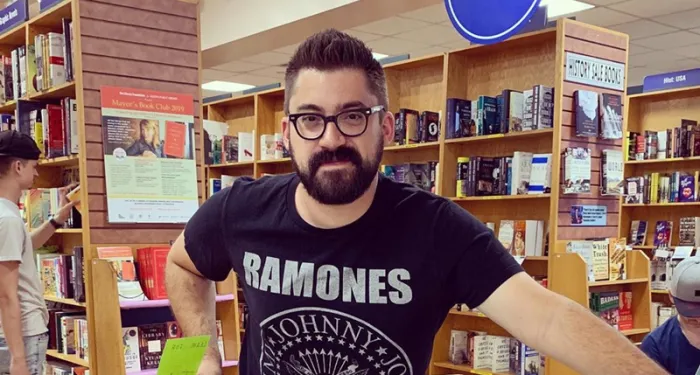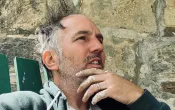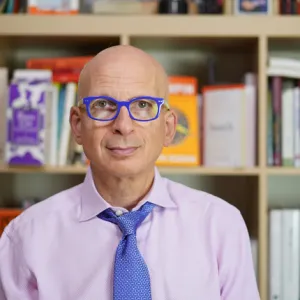
Austin Kleon
The Shape of a Good Life
Artist and author Austin Kleon talks about what lasting success really means and how to achieve it.
Those of you who listen to this podcast know that I reference Kleon all the time. We're currently giving away copies of his most recent book, "Keep Going." It's my way of doing a good turn back to all of you in our audience.
I wanted to feature Austin on this show because, unbeknownst to him, he does a crazy good turn for me every single week. He publishes a newsletter with 10 insights, comments, thoughts and recommendations, and I always learn something from them. I mean always.
AUSTIN KLEON: Well, I’m thrilled to hear it. I mean, I’ve always thought that my books were sort of like more of how to live guides than just making art guides. So I suppose there’s a streak of armchair philosopher in me. I’m thrilled to hear whenever my work is used in other fields because I’m someone who has been inspired by things outside of my own field. Maybe one of the key takeaways from my books is that to be a voracious devourer of things outside of your field of expertise and do what Brian Eno calls import export, where you export something from one field and import it into your own and sort of make it yours.
FRANK BLAKE: Well, you’re a brilliant exporter. I’ll give you one example of a line of yours that I use frequently and maybe you can give some description around it. The line is about job titles and if they’re taken too seriously, they’ll make you feel like you need to work in a way that befits the title, not the way that fits the actual work. Was there some background that drove that because boy, is that true?
AUSTIN KLEON: Well, the thing that springs immediately to mind is when I worked in advertising and I always felt they would divide us between, there was accounts and there was creative. And I always thought accounts should think more like creative and creative should think more like accounts. I always felt like we stayed in our own lanes too much. But for me personally, I’m someone who got the career that I have by operating in a very particular way, which is, in the course of trying to figure out things for my own work, I share that those sort of things I’ve learned freely with others. And I remember after my book “Steal Like an Artist” came out, I was sort of thinking like, “Well, I’m a real author now. I’m an important person. I shouldn’t just be giving things away.” And so, I would sit and I would only maybe share a blog post every week instead of every day like I used to.
And slowly I found out that like, well actually this is keeping me from doing the kinds of work that led to my success in the first place. And I think that happens to a lot of people who have any kind of success is you start working in the way you think you should instead of the way that you know works. So I just think it’s whenever I step back and think, what was it that got me here in the first place? And I go back to those kind of roots, good things happen for me.
FRANK BLAKE: It is a great universal principle. I love, in your latest book, I think you have one of the great first lines. I mean, everybody loves first lines in books, but I love the first line in “Keep Going.” It is, “I wrote this book because I needed to read it.” That is just brilliant. Can you explain that a little bit?
AUSTIN KLEON: Well, my other books were sort of assemblages of things that I’d written for other people. “Steal Like An Artist” was written for me in the past. It was a book that I wish I had had when I was starting out. My book after that, “Show Your Work!,” was a book that attempted to answer questions that people had asked me over the years about self-promotion. I hit a point in my career about a couple of years ago where I was sort of, you know, I’ve been doing it for 10 years. I was feeling pretty burnt out. And then I felt like a lot of the kind of tone of social media and things had kind of shifted where I found it very distracting and disheartening to be online in the way that I used to be.
And so these two things kind of came together where my career and social media were kind of at these weird points and I needed some sort of, I needed like a pep talk for myself basically. And so “Keep Going” was something that was the first time I actually wrote something because I saw a empty space on the bookshelf and I wanted to fill it.
FRANK BLAKE: That is perfect. I love that you have a great section in the book about paying attention to what you pay attention to. Did that derive from the same process?
AUSTIN KLEON: Absolutely. That was a line, that was something that this writer named Amy Krouse Rosenthal wrote, and Amy passed away a few years ago, but she was a big influence on me. And what I take from that line, pay attention to what you pay attention to. That’s really sort of the first, that’s kind of the first creative impulse in a lot of ways, in that actually doing something with your thoughts and your thinking. For me personally, that’s what a notebook or a daily diary is. When I write in my notebook, when I write down my ideas, when I keep track of my life in my notebook, I will start to detect patterns over time. And often I’ll repeat myself. And whenever I find myself repeating myself, I find out, “Oh, this is something that really matters to me.” You know? And part of this was influenced by how I’m a big Henry David Thoreau junkie. I started reading his diary a few years ago and he was the guy who repeated himself a lot in his diaries. He would have the same idea over and over. And those were the ideas that he sort of took up and kind of mashed up into his books and his essays.
And so I think for someone who wants to lead a more creative life, one of the first things to do is just pay attention to what you pay attention to because we’re often getting our attention caught by things, but we often don’t notice our patterns until they’re right there in front of us.
FRANK BLAKE: And do you ever have to correct yourself? Do you ever find yourself going, “Oh my gosh, I look at what I’m paying attention to now and that is the wrong. I’m going down the wrong path.”
AUSTIN KLEON: Every day.
FRANK BLAKE: Every day?
AUSTIN KLEON: Every day I have to correct myself in some ways. I think the pattern recognition thing has actually helped me a lot as a parent. I have two young boys, seven and four, and paying attention to my patterns, as a parent, I think it’s probably the same as like paying attention to your patterns as a worker or a boss or any kind of worker because parenting is a kind of work. I find myself, if I can pay attention to those patterns, I can understand when I’m in them and I can figure out how to get out of them again.
FRANK BLAKE: Yeah. Is there someone over the course of your career who’s particularly helped you, done something particularly kind for you that notable stands out?
AUSTIN KLEON: Oh gosh. So many. The person who is on my mind today, who I’m most grateful for. I don’t even really know that she knew what she was doing when she was so kind to me. But there is a woman named Lynda Barry who is a cartoonist, and for the past probably half decade or so, she has been teaching at the University of Wisconsin at Madison. And she has a new book out today called “Making Comics.” I met Lynda through mutual friends, a friend of ours. I went to see her speak at Oberlin College when I was I think 22 or 23. And I was so enthralled by her and she let me tag along with my wife. We tagged along with her and my other friend Dan Chaon and sat at the bar for about two hours after the talk. And I swear that I have run a good portion of my career off the fumes of just meeting her when I was that age.
And I think that Lynda is one of those people who she manages to change people’s lives without even knowing that she’s doing it that much. She exudes this kind of magical energy and the way that she talks about creativity and creative work, I find so incredibly generous that she just can’t help but change people’s lives. And I feel so grateful to her, and you have those moments in your life where you just meet the right person at the right time and she’s definitely one of them.
FRANK BLAKE: That’s great. And you have an interesting part of your book about making gifts and is that something you’re conscious of or you’re conscious when other people do that for you?
AUSTIN KLEON: I mean, I think gratitude is something that I work on a lot these days. I think a lot of us could stand to, it’s a kind of a chaotic time and I think that in my life it’s been really important to have some sort of gratitude practice and my diaries come into that. I always think of my diaries as kind of like, they’re like paper prayers in a sense. But as far as gifts go, I think that I was really inspired by this book called “The Gift” by this guy named Lewis Hyde. In Hyde’s work he talks about how you can’t really have art without some kind of gift aspect. Hyde’s idea is that the artist is awoken to their gifts through the gifts of others and then they pass on that gift in their own work.
So for example, if we go back to Lynda, you know, her gifts as a speaker, as a thinker, as a cartoonist, my own sort of gifts were awoken through her. And the way that I passed those gifts on now is through my books and through my work. And hopefully the people who get that stuff will then pass those gifts on in their work. And so I’ve been really influenced by Hyde’s work and that idea of the gift. And I, in the book in particular, I wanted people to, whenever they felt like they had sort of gotten too business-like with things or too much like the business side of things has really ruined their love of their work, to think about how they can pull their work back into that gift world and to do things purely for the generosity of it.
FRANK BLAKE: And it’s actually interestingly true even on the business side, to really succeed in business, you have to be focused on your customer. You have to be thinking about giving and serving and it isn’t. The best businesses always aren’t about the bottom line. They’re about something else. It’s another universal truth.
AUSTIN KLEON: I think, again, this is something that I’ve learned from the few business people I know, which is sort of when you think of your work as a service job. And when I think of my job as serving the reader or serving that gift in some ways, things go much better for me than if I just think, “Well, how am I going to pull more dough in?”
FRANK BLAKE: How are you going to commercialize this?
AUSTIN KLEON: Exactly. Yeah.
FRANK BLAKE: Exactly. So we’ve done a great, we’ve done a couple now of promotions of your book and part of it is listeners can get 10 books that you recommend for reading. And it is such a diverse list and I’m curious as to what’s the string that holds them all together?
AUSTIN KLEON: Me. I would be the string, I guess. I mean, first of all, I’m very much, I think about the line from “Alice in Wonderland,” you know, she says, “What is the point of a book without any pictures in it?” I’m a person who is very interested in books that managed to merge pictures and words together. I think, when we’re young we have books with pictures in them and we sort of understand that language and how that works. And then over time we’re sort of told that serious books have words in them and we graduate to chapter books and things like that.
AUSTIN KLEON: So I’m always interested in people who manage to write very visual books for people of all ages. So that’s something that you might detect in a lot of the work that I love. But also I like work that is light on a sentence- to-sentence level. I like work that has a sort of element of joy or lightness in it. You can take on a serious topic and still have a sort of lightness and playfulness to your prose. And so I always appreciate books that have a sort of lightness or comedic touch to them. And I also like things, I’m sort of obsessed with books and how they’re structured. I like books that are structured in a way that make it real easy for the reader. And so, I think personally, and I feel this very strongly, even though I consider myself to be a very serious reader, I think reading should be a joy. I think it should be fun and I think it should make you feel alive when you’re doing it.
The older I get, the more I sort of err on the side of the books that keep me turning pages. The books that I really resonate with, those are the right books. And the books that I sort of have to slog through. They’re just not the right books for me at this moment
FRANK BLAKE: That is so interesting because I’ve got to tell you, Austin, one of the common things I’ve given your book to just a lot of people, including every single person in my family. And the first reaction is, first off I think people are a little, “Oh gosh, Frank’s giving me a book. I guess I have to read it.” Then they get the book and they go, “Oh my gosh, this looks like it’s fun.” And they start immediately reading it. So the accessibility that you give in your books is a real plus. It is so much more inviting than the typical book. So congratulations on being able to accomplish that.
AUSTIN KLEON: Well, thank you. I like that word inviting because that’s what I want my work to be. I want all of my work to be an invitation in a sense. I don’t just want the book to be inviting, but I want the message to be inviting. And the message is sort of like, “Come on. Come with us. Check out this thing we’re all doing.” So, this is maybe a little bit of an irritating desert island question, but if you could only take three books to a desert island and that’s what you were going to read for the next 20 years, what are the three books you’d take?
AUSTIN KLEON: Oh my goodness. I have not thought about this for a while. I’m trying to think here what are the books that would give me joy over and over? I’m looking at a book of Michel de Montaigne’s Essays right now and I’ve never been able to read all those and I think that would keep me busy for a really long time. He has such a lightness of spirit and he’s very funny. So I might go with that. I would probably bring a cartoon collection. I would probably bring a Peanuts book, like a Charlie Brown where it was strips.
I love to read Nancy Ernie Bushmiller’s old stuff. When you were describing my books, someone once said of Nancy, it’s easier to read it than to not read it. I’ve always loved that. I might bring my edition of Thoreau’s Journal, the abridged. It’s meant so much to me in the past couple of years and I think there’s so much wisdom in there that those are the three books I would bring right now. I don’t know. The Montaigne one is a weird one, but I know that that’s inspired people such as Shakespeare read Montaigne, Thoreau read Montaigne. So I would probably go with that too. So those are the three. But I would definitely bring a cartoon collection with me because I love, I have a particular fondness for collections of newspaper comics. There’s something about having a bunch of newspaper strips in a book that I just love that form. I love reading collections of comics like that.
FRANK BLAKE: That’s really interesting, unique, idiosyncratic list. That’s a great list. I’m going to do one other quote just from you that I’d love you to talk about a bit, and the quote is to the effect of you don’t want to hear about the 30 year olds who become rich and famous. You want to hear how an 80 year old spent her life in obscurity but kept making art and lived a happy life. I wanted to know what was behind that.
AUSTIN KLEON: It’s interesting, I was really inspired the past couple of years. There have been some really good documentaries come out about, for lack of a better terminology, senior citizen artists. So, I’m a huge David Hockney fan, the painter, and I went to one of his shows recently and I just, a couple of years ago, and I just couldn’t believe that this guy in his 80s was just doing this, like still just painting these masterful paintings. And I was inspired by like the Joan Rivers documentary “Piece of Work,” the way she talks about keeping it fresh and stuff like that. Again, I was sort of thinking to myself, “You know what? What am I in this for? Like what would a good life look like if I get lucky enough to get the years?” And I started realizing that the people I admire, I mean, they were just able to pull out maybe one or two or three careers even out of their lives. They were able to sort of reinvent or keep things fresh.
And I was like, “Those are the people that I want to pay attention to.” because we’re a culture that celebrates quick success. We’re all about the, you know, there’s always some 25 year old who just sold his startup and we celebrate them. I read the obituaries a lot. That’s something, man. It’s something that I do and I’m always looking for what is the shape of a good life? Like what does it look like at the end? So I was really inspired by people like Bill Cunningham who got on his bicycle every day and took pictures and did the wonderful fashion spreads in the New York Times. That’s another great documentary.
So, yeah, I just look to my elders, to people who have managed to hang in, particularly in the creative fields. I don’t remember which obituary it was, but this guy said, “I’ve woken up every day of my life wondering if I could do it again today.” I thought, “That’s really the reality of it. That’s really the reality of doing this kind of work where you have to come up with new ideas and new things all the time.” You not only have to have the endurance to get through it, but you also have to just be okay with the uncertainty that you’re going to wake up one day and just have nothing. But then if you keep at it and you wake up the next week, you’re going to find something. And to have that kind of hope and faith in your process and to just stick around long enough for your efforts to pay off. It’s just something that I think that our elders can show us.
FRANK BLAKE: That’s terrific. That’s amazing. Are there some holiday stories that you’d share, things that made a huge impact on you as a child or as an adult?
AUSTIN KLEON: I have to say that Christmas, I come from a, my parents are divorced and Christmas was not always the most pleasant season when I was growing up. I have been thrilled in my life to be able to sort of start over again with my own family and enjoy Christmas. I actually, every year I read Dickens’ A Christmas Carol. I think there’s a reason it’s lasted all these years. I think it always speaks to me. You know, when Jacob Marley rattles his chains and says, “Business, you know, mankind was my business.” You know, that always shakes me up. I love it. And so I think that is probably one of my favorite rituals at Christmas time, is to read Dickens.
FRANK BLAKE: And that book in particular is worth reading over and over again.
AUSTIN KLEON: you know, something that’s changed my life a lot too is being a re-reader. I really believe in every time you come to a book, the same book, you’re a different person. And so it’s a different book for you. And the books that you come to again and again, the reason they can feed you over and over is because you’re different each time, you’ve gone through more and you can pull more out of them. I know we’re sort of in this world where there’s just so much at our fingertips. There’s so much that we feel we should be reading. Like why read an old book when you could read a new one? But I think it’s really important to keep those books around that really speak to you and to pull them out every once in a while and because they kind of show us how far we’ve come.
FRANK BLAKE: So a broad last question. One of the things that really was the start of your discussion about how you think about art and how you think about art pulling people together and what’s happening now. Do you feel like you’re rowing against the tide on that? The way people are interacting with content, the way they actually seem to want to be divided or do you think where you are it’s actually the tide starting to come in.
AUSTIN KLEON: I think that the older I get, the more that I think that everyone, whether it’s in a democracy or whether it’s just in your life, I think everyone needs to pick like one or two or three things that they want to kind of carry the torch for. You know? So for me it’s like, like if we’re talking about things that I want to save in the country, it would be like public libraries, for example, like public institute. The public library is a thing that I care deeply about. It’s inspired me endlessly and I think that it’s a good thing for a healthy democracy. So, that’s something I can throw all my efforts in.
But as far as how I’ve started to think about my work, I don’t know where the tide is headed, but I just feel very strongly that it is my job to love the things that I love and to love the ways of operating that I love and to do so publicly and to try to pass those on to as many people as I can, including my family. My job is just to keep those things alive, at least in my own life. And if I can keep them alive in my own life and try to share them as much as I can, then maybe there’ll be kept alive for the people who come after me. And I don’t think about it too much beyond that.
FRANK BLAKE: That is brilliant. And I can tell you, as I said at the start, you for me and I think an awful lot of other people, you do a crazy good turn, not only with your books, but every week with your newsletter. I always look forward to opening them. It’s a great treat going through them. So, thank you very much for doing that. And I encourage all of our listeners to sign up, buy your books, follow you. Why don’t you tell everybody what’s the best way to get in touch with the things you do?
AUSTIN KLEON: Just type my name into the Google box. Yeah, AustinKleon.com and you’ll find my blog and my newsletter and all my books.
FRANK BLAKE: Yeah. Perfect. All right. Thank you. Thanks very much, Austin. It’s been an incredible pleasure talking to you.
AUSTIN KLEON: Thank you, Frank. This was a pleasure.




